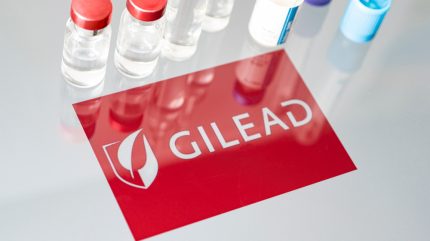
The US Food and Drug Administration (FDA) has placed a clinical hold on several of Gilead’s trials evaluating two HIV treatment candidates, though the rest of the drugmaker’s diverse pipeline remains unaffected.
Gilead said that impacted trials involved those evaluating GS-1720, an investigational integrase strand transfer inhibitor, and/or GS-4182, an investigational capsid inhibitor.

Discover B2B Marketing That Performs
Combine business intelligence and editorial excellence to reach engaged professionals across 36 leading media platforms.
The two main studies that have been stalled are WONDERS-1 and WONDERS-2, both Phase II/III trials evaluating a combination therapy with the two drugs.
Shares in Nasdaq-listed Gilead opened 0.3% lower today (11 June) at $109.75, after initially dropping 4% yesterday following the announcement. The company’s market cap is $137bn.
Gilead is considered the leading big pharma in HIV treatments. WONDERS-1 (NCT06544733) is trialling an oral weekly regimen of GS-1720 in combination with GS-4182 in virologically suppressed people with HIV-1, with efficacy and safety compared to Gilead’s already-approved pill Biktarvy (bictegravir/emtricitabine/tenofovir alafenamide).
Meanwhile, WONDERS-2 (NCT06613685) is testing the same combo therapy with comparison to Biktarvy in HIV patients who had not received treatment.

US Tariffs are shifting - will you react or anticipate?
Don’t let policy changes catch you off guard. Stay proactive with real-time data and expert analysis.
By GlobalDataThree additional Phase I trials with either one or both drugs are also on hold, according to Gilead.
The FDA placed a hold on the trials due to the identification of a safety signal of decreases in CD4+T-cell (CD4) and absolute lymphocyte counts in a subset of participants receiving the GS-1720 and GS-4182 combination.
CD4+T-cells and lymphocytes are both crucial elements of the immune system. Low levels of either increase the likelihood of infections and other health problems. HIV itself can reduce CD4 count – a value lower than 200 indicates acquired immunodeficiency syndrome (AIDS).
In a statement, Gilead said: “We intend to investigate and pursue the potential of both agents and are committed to working with regulatory authorities to resolve the issues underlying the clinical hold.”
No timeline was provided by the company on when it expects the studies to resume.
Gilead said the hold does not impact the rest of its HIV pipeline, which includes other long-acting oral and injectable investigational treatment combinations. Gilead’s HIV pipeline is split into segments of cures, preventions, and treatments. The WONDER studies are part of the treatment section, along with the ARTISTRY programme evaluating an oral combination of bictegravir/lenacapavir, ISLEND studies with lenacapavir/islatravir, amongst others.
Gilead already has several approved HIV treatments and prevention options in the US. Antiviral Biktarvy is the company’s top-selling HIV drug, generating global revenue of $13.4bn in 2024, an increase of 13% compared to 2023.
Eyes of the pharmaceutical industry will be on Gilead’s upcoming Prescription Drug User Fee Act (PDUFA) date for lenacapavir on 19 June. According to GlobalData analysis, the drug, if approved, has the potential to revolutionise HIV pre-exposure prophylaxis (PrEP).
Editor’s note: The fifth paragraph of this article was updated on 12 June to correctly list the active ingredients in Biktarvy. A previous version incorrectly stated it solely contained bictegravir. A small amendment to the spelling of the ‘ARTISTRY’ programme was also made.




